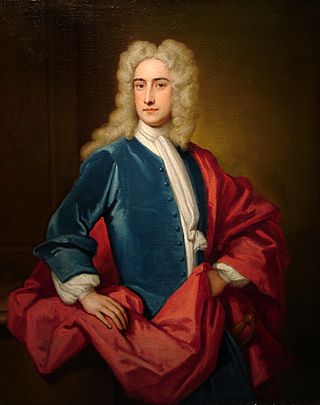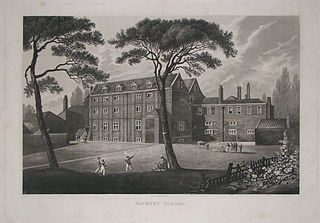External links
- Attribution
![]() This article incorporates text from a publication now in the public domain : Lee, Sidney, ed. (1897). "Sawyer, Edmund". Dictionary of National Biography . Vol. 50. London: Smith, Elder & Co.
This article incorporates text from a publication now in the public domain : Lee, Sidney, ed. (1897). "Sawyer, Edmund". Dictionary of National Biography . Vol. 50. London: Smith, Elder & Co.
Edmund Sawyer (died 1759) was an English barrister. He became a master of chancery, and is known also as an officer of arms and historical compiler.
Born shortly after 1687, he was probably a younger son of Edmund Sawyer of White Waltham, Berkshire, by his wife Mary, second daughter of John Finch of Fiennes, Berkshire. He was of the Inner Temple, but on 28 April 1718 he was admitted as a member of Lincoln's Inn. [1]
Undertaking legal business for John Montagu, 2nd Duke of Montagu, Sawyer became through the Duke's connection gentleman-usher to the Order of the Bath in 1725, and Brunswick herald in 1726. The latter involved him in the 1727 coronation of George II of Great Britain. In 1738 he was made a master in chancery, and around this time he vacated the posts with the Order of the Bath. [2] In 1750, Sawyer and Richard Edwards were nominated as commissioners to examine the claims of the creditors of the African Company of Merchants. [1]
Sawyer died a master in chancery, on 9 October 1759. [1]
Sawyer compiled Memorials of Affairs of State in the Reigns of Queen Elizabeth and King James London, 3 vols. 1725. It used the papers of Sir Ralph Winwood and Sir Henry Neville. [1] [2]
![]() This article incorporates text from a publication now in the public domain : Lee, Sidney, ed. (1897). "Sawyer, Edmund". Dictionary of National Biography . Vol. 50. London: Smith, Elder & Co.
This article incorporates text from a publication now in the public domain : Lee, Sidney, ed. (1897). "Sawyer, Edmund". Dictionary of National Biography . Vol. 50. London: Smith, Elder & Co.

Edmund Mortimer, 5th Earl of March, 7th Earl of Ulster, was an English nobleman and a potential claimant to the throne of England. A great-great-grandson of King Edward III of England, he was heir presumptive to King Richard II of England when the latter was deposed in favour of Henry IV. Edmund Mortimer's claim to the throne was the basis of rebellions and plots against Henry IV and his son Henry V, and was later taken up by the House of York in the Wars of the Roses, though Mortimer himself was an important and loyal vassal of Henry V and Henry VI. Edmund was the last Earl of March of the Mortimer family.

Christopher Hatton, 1st Baron Hatton KB PC FRS was first cousin twice removed to the Elizabethan politician, Sir Christopher Hatton and a prominent Royalist during the reign of King Charles I of England.

John Montagu, 2nd Duke of Montagu,, styled Viscount Monthermer until 1705 and Marquess of Monthermer between 1705 and 1709, was a British peer.

Samuel Sandys, 1st Baron Sandys, was a British Whig politician who represented Worcester in the House of Commons from 1718 until 1743, when he was created Baron Sandys. He held numerous posts in the government of the United Kingdom, namely Chancellor of the Exchequer, Leader of the House of Commons, Cofferer of the Household and First Lord of Trade. He was also a justice in eyre.

George Butler was an English schoolmaster and divine, Headmaster of Harrow School from 1805 to 1829 and Dean of Peterborough from 1842 to his death in 1853.

Edmund Dunch of Little Wittenham, Berkshire and Down Ampney, Gloucestershire, was an English Whig politician who sat in the English and British House of Commons between 1701 and 1719.

Charles Moss was an Anglican clergyman who served as Bishop of St David's from 1766 to 1774 and Bishop of Bath and Wells from 1774 to 1802.

John Parker, 1st Baron Boringdon was a British peer and Member of Parliament.

Major-General Henry Scott, 1st Earl of Deloraine KB was a Scottish military officer and peer.

Frederick Montagu was a British Whig MP.

Thomas Montagu, 4th Earl of Salisbury, KG of Bisham in Berkshire, was an English nobleman and one of the most important English commanders during the Hundred Years' War.

Francis Norris, 1st Earl of Berkshire was an English nobleman and courtier.

Sir Charles Cornwallis was an English courtier and diplomat.

Newcome's School was a fashionable boys' school in Hackney, then to the east of London, founded in the early 18th century. A number of prominent Whig families sent their sons there. The school closed in 1815, and the buildings were gutted in 1820. In 1825 the London Orphan Asylum opened on the site. Today the Clapton Girls' Academy is located here.

Sir William Scott, 2nd Baronet of Thirlestane was a Scottish lawyer, known as a Neo-Latin poet.
Sir Richard Manningham M.D. (1690–1759) was an English physician and man-midwife, now remembered for his involvement in the Mary Toft hoax.
James Edmund Vincent was a Welsh barrister, known as a journalist and author.
Charles Montagu, of Papplewick, Nottinghamshire. was a British landowner and politician who sat in the House of Commons between 1722 and 1759.

Richard Hale M.D. (1670–1728) was an English physician, elected a Fellow of the Royal Society in 1721.